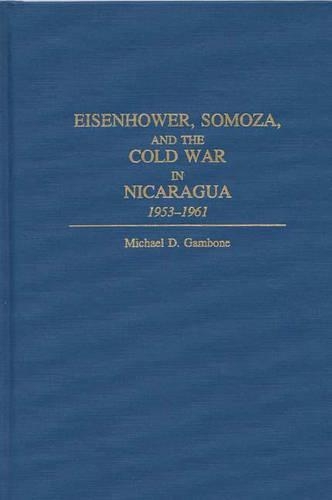
Eisenhower, Somoza, and the Cold War in Nicaragua: 1953-1961
(Hardback)
Publishing Details
Eisenhower, Somoza, and the Cold War in Nicaragua: 1953-1961
By (Author) Michael D. Gambone
Bloomsbury Publishing PLC
Praeger Publishers Inc
16th September 1997
United States
Classifications
Tertiary Education
Non Fiction
International relations
327.7307285
Physical Properties
Hardback
264
Description
During the Cold War era, the United States faced the prospect of expanding its power in Central America. But we miscalculatedgrievously. After 1945, Central America teemed with leaders willing to alter the region's quasi-colonial status. Some, like Fidel Castro, sought out revolution to shatter the status quo. Others, like Anastasio Somoza Garcia, attempted to seek out new directions along more subtle paths. Nicaragua subsequently challenged American hegemony in a manner at once more deliberate and more dangerous than any other effort in the hemisphere. The Somoza regime, unlike its contemporaries, chose to utilize American institutions and American preferences to subvert the latter's power rather than reinforce it. American arrogance, combined with a complacent approach to policy in its global backyard, offered a myriad of political, military, and economic opportunities to a leader willing to take risks. In the years after 1945, Somoza was thus able to peel away layers of clientage until, at certain moments, he could act as a partner of his northern neighbor.
Reviews
.,."Gambone contributes a sound overview of U.S. Nicaraguan relations under Eisenhower."-Latin American Research Review
"His detailed examination of the Dwight Eisenhower administrations offers us a closer view of the Somoza years in Nicaragua and the special relationship between the governments of Nicaragua and the United States thatn do earlier works....Gamobone's detailed and persuasive narrative of relationsbetween the Eisenhower administrations and the Somazas expand significantly the available information on that period of Central American history.....[T]he book's greatest strength is found in its explanation of how decisions were made in Washington....What Gambone does do very well is to show how the Somazas manipulated U.S. policy toward their own ends, working effectively within the framework of North American instutions and practices."-South Eastern Latin Americanist
"Michael D. Gambone has made admirable strides towards filling this lacuna. Gambone demonstrates a more sophisticated understanding of political, stategic, and economic dynamics in Nicaragua....[H]e has written a book that was long overdue and merits careful reading..."-The International History Review
...Gambone contributes a sound overview of U.S. Nicaraguan relations under Eisenhower.-Latin American Research Review
His detailed examination of the Dwight Eisenhower administrations offers us a closer view of the Somoza years in Nicaragua and the special relationship between the governments of Nicaragua and the United States thatn do earlier works....Gamobone's detailed and persuasive narrative of relationsbetween the Eisenhower administrations and the Somazas expand significantly the available information on that period of Central American history.....[T]he book's greatest strength is found in its explanation of how decisions were made in Washington....What Gambone does do very well is to show how the Somazas manipulated U.S. policy toward their own ends, working effectively within the framework of North American instutions and practices.-South Eastern Latin Americanist
Michael D. Gambone has made admirable strides towards filling this lacuna. Gambone demonstrates a more sophisticated understanding of political, stategic, and economic dynamics in Nicaragua....[H]e has written a book that was long overdue and merits careful reading...-The International History Review
Michael D. Gambone has written a very useful study of United States relations with Nicaragua, a small outpost on the periphery of the American empire, during the early Cold War....This work is an in-depth study of the impact of United States policy on Nicaragua....The book is well researched with a decent number of Nicaraguan sources, along with traditional sources from the National Archives, the Eisenhower Library, and secondary literature.-The Journal of American History
Using extensive material relating to economic support and technical assistance, Gambone shows that Eisenhower's policy toward Nicaragua was much more complex and less supportive of the Somoza dictatorship than it has often been portrayed.-Choice
..."Gambone contributes a sound overview of U.S. Nicaraguan relations under Eisenhower."-Latin American Research Review
"Michael D. Gambone has written a very useful study of United States relations with Nicaragua, a small outpost on the periphery of the American empire, during the early Cold War....This work is an in-depth study of the impact of United States policy on Nicaragua....The book is well researched with a decent number of Nicaraguan sources, along with traditional sources from the National Archives, the Eisenhower Library, and secondary literature."-The Journal of American History
"Using extensive material relating to economic support and technical assistance, Gambone shows that Eisenhower's policy toward Nicaragua was much more complex and less supportive of the Somoza dictatorship than it has often been portrayed."-Choice
Author Bio
MICHAEL D. GAMBONE is Assistant Professor of History at Alvernia College.
